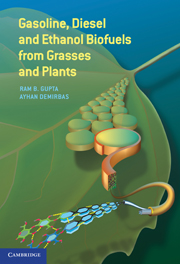Book contents
- Frontmatter
- Contents
- Preface
- 1 Introduction
- 2 Air Pollution and Global Warming from the Use of Fossil Fuels
- 3 Renewable Energy Sources
- 4 Biomass Availability in the World
- 5 Conventional Ethanol Production from Corn and Sugarcane
- 6 Ethanol from Biomass by Fermentation
- 7 Biodiesel from Vegetable Oils
- 8 Diesel from Biomass Gasification Followed by Fischer–Tropsch Synthesis
- 9 Bio-Oil from Biomass Pyrolysis
- 10 Biocrude from Biomass Hydrothermal Liquefaction
- 11 Solar and Wind Energy for Biofuel Production
- 12 Environmental Impacts of Biofuels
- 13 Economic Impact of Biofuels
- 14 Biofuel Policy
- References
- Index
2 - Air Pollution and Global Warming from the Use of Fossil Fuels
Published online by Cambridge University Press: 05 June 2012
- Frontmatter
- Contents
- Preface
- 1 Introduction
- 2 Air Pollution and Global Warming from the Use of Fossil Fuels
- 3 Renewable Energy Sources
- 4 Biomass Availability in the World
- 5 Conventional Ethanol Production from Corn and Sugarcane
- 6 Ethanol from Biomass by Fermentation
- 7 Biodiesel from Vegetable Oils
- 8 Diesel from Biomass Gasification Followed by Fischer–Tropsch Synthesis
- 9 Bio-Oil from Biomass Pyrolysis
- 10 Biocrude from Biomass Hydrothermal Liquefaction
- 11 Solar and Wind Energy for Biofuel Production
- 12 Environmental Impacts of Biofuels
- 13 Economic Impact of Biofuels
- 14 Biofuel Policy
- References
- Index
Summary
Introduction
Today's world is facing two environmental problems: global warming and air pollution. Both of these are linked to the large-scale use of fossil fuels. Energy use is being reevaluated because of the quadrupling of oil prices in the 1970s and rapid increase in 2008, the growing awareness of energy-related pollution, and the possibility of climate change. As a result, there has been a significant improvement in energy efficiency in all sectors, including industry, power generation, lighting, household appliances, transportation, and climate control of buildings. In fact, efficient use of energy has historically helped increase the energy intensity in all Organization for Economic Cooperation and Development (OECD) countries and more recently in transition economies. Unfortunately, a rapid increase in the per capita use of fossil energy has accelerated the rate of atmospheric pollution.
Air Pollution
Air pollution (Figure 2.1) is due to the harmful substances (natural or man-made) that we breathe, including fine particles (produced from burning of fossil fuels), ground-level ozone (a reactive form of oxygen that is a component of urban smog), and gases such as carbon monoxide, chemical vapors, nitrogen oxides, and sulfur dioxide. The ill effects of air pollutants on human health have been known for the last 30 years; these include asthma, cardiovascular diseases, decreased lung function, and allergies. Of urgent concern is the long-term ill effect on lung development in children. In addition, air pollution causes damage to plant and animal lives.
- Type
- Chapter
- Information
- Publisher: Cambridge University PressPrint publication year: 2010



